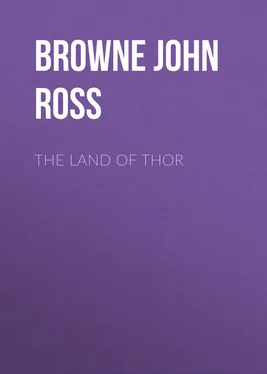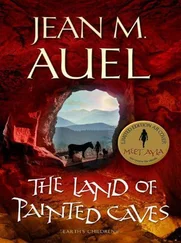John Browne - The Land of Thor
Здесь есть возможность читать онлайн «John Browne - The Land of Thor» — ознакомительный отрывок электронной книги совершенно бесплатно, а после прочтения отрывка купить полную версию. В некоторых случаях можно слушать аудио, скачать через торрент в формате fb2 и присутствует краткое содержание. Жанр: foreign_antique, foreign_prose, Путешествия и география, на английском языке. Описание произведения, (предисловие) а так же отзывы посетителей доступны на портале библиотеки ЛибКат.
- Название:The Land of Thor
- Автор:
- Жанр:
- Год:неизвестен
- ISBN:нет данных
- Рейтинг книги:4 / 5. Голосов: 1
-
Избранное:Добавить в избранное
- Отзывы:
-
Ваша оценка:
- 80
- 1
- 2
- 3
- 4
- 5
The Land of Thor: краткое содержание, описание и аннотация
Предлагаем к чтению аннотацию, описание, краткое содержание или предисловие (зависит от того, что написал сам автор книги «The Land of Thor»). Если вы не нашли необходимую информацию о книге — напишите в комментариях, мы постараемся отыскать её.
The Land of Thor — читать онлайн ознакомительный отрывок
Ниже представлен текст книги, разбитый по страницам. Система сохранения места последней прочитанной страницы, позволяет с удобством читать онлайн бесплатно книгу «The Land of Thor», без необходимости каждый раз заново искать на чём Вы остановились. Поставьте закладку, и сможете в любой момент перейти на страницу, на которой закончили чтение.
Интервал:
Закладка:
In contemplating the dreary journey of these poor creatures – a journey of some fifteen hundred or two thousand miles – I was insensibly reminded of that touching little story of filial affection, “Elizabeth of Siberia,” a story drawn from nature, and known in all civilized languages.
Not long after the departure of the Siberian prisoners, I witnessed, in passing along one of the principal streets, a grand funeral procession. The burial of the dead is a picturesque and interesting ceremony in Moscow. A body of priests, dressed in black robes and wearing long beards, take the lead in the funeral cortége, bearing in their hands shrines and burning tapers. The hearse follows, drawn by four horses. Black plumes wave from the heads of the horses, and flowing black drapery covers their bodies and legs. Even their heads are draped in black, nothing being perceptible but their eyes. The coffin lies exposed on the top of the hearse, and is also similarly draped. This combination of sombre plumage and drapery has a singularly mournful appearance. Priests stand on steps attached to the hearse holding images of the Savior over the coffin; others follow in the rear, comforting the friends and relatives of the deceased. A wild, monotonous chant is sung from time to time by the chief mourners as the procession moves toward the burial-ground. The people cease their occupations in the streets through which the funeral passes, uncover their heads, and, bowing down before the images borne by the priests, utter prayers for the repose of the dead. The rich and the poor of both sexes stand upon the sidewalks and offer up their humble petitions. The deep-tongued bells of the Kremlin ring out solemn peals, and the wild and mournful chant of the priests mingles with the grand knell of death that sweeps through the air. All is profoundly impressive: the procession of priests, with their burning tapers; the drapery of black on the horses; the coffin with its dead; the weeping mourners; the sepulchral chant; the sudden cessation of all the business of life, and the rapt attention of the multitude; the deep, grand, death-knell of the bells; the glitter of domes and cupolas on every side; the green-roofed sea of houses; the winding streets, and the costumes of the people – form a spectacle wonderfully wild, strange, and mournful. In every thing that comes within the sweep of the eye there is a mixed aspect of Tartaric barbarism and European civilization. Yet even the stranger from a far-distant clime, speaking another language, accustomed to other forms, must feel, in gazing upon such a scene, that death levels all distinctions of race – that our common mortality brings us nearer together. Every where we are pilgrims on the same journey. Wherever we sojourn among men,
“The dead around us lie,
And the death-bell tolls.”
CHAPTER V.
TEA-DRINKING
The traktirs , or tea-houses, are prominent among the remarkable institutions of Russia. In Moscow they abound in every street, lane, and by-alley. That situated near the Katai Gorod is said to be the best. Though inferior to the ordinary cafés of Paris or Marseilles in extent and decoration, it is nevertheless pretty stylish in its way, and is interesting to strangers from the fact that it represents a prominent feature in Russian life – the drinking of tchai .
Who has not heard of Russian tea? – the tea that comes all the way across the steppes of Tartary and over the Ural Mountains? – the tea that never loses its flavor by admixture with the salt of the ocean, but is delivered over at the great fair of Nijni Novgorod as pure and fragrant as when it started? He who has never heard of Russian tea has heard nothing, and he who has never enjoyed a glass of it may have been highly favored in other respects, but I contend that he has nevertheless led a very benighted existence. All epicures in the delicate leaf unite in pronouncing it far superior to the nectar with which the gods of old were wont to quench their thirst. It is truly one of the luxuries of life – so soft; so richly yet delicately flavored; so bright, glowing, and transparent as it flashes through the crystal glasses; nothing acrid, gross, or earthly about it – a heavenly compound that “cheers but not inebriates.”
“A balm for the sickness of care,
A bliss for a bosom unbless’d.”
Come with me, friend, and let us take a seat in the traktir. Every body here is a tea-drinker. Coffee is never good in Russia. Besides, it is gross and villainous stuff compared with the tchai of Moscow. At all hours of the day we find the saloons crowded with Russians, French, Germans, and the representatives of various other nations – all worshipers before the burnished shrine of Tchai . A little saint in the corner presides especially over this department. The devout Russians take off their hats and make a profound salam to this accommodating little patron, whose corpulent stomach and smiling countenance betoken an appreciation of all the good things of life. Now observe how these wonderful Russians – the strangest and most incomprehensible of beings – cool themselves this sweltering hot day. Each stalwart son of the North calls for a portion of tchai , not a tea-cupful or a glassful, but a genuine Russian portion – a tea-potful. The tea-pot is small, but the tea is strong enough to bear an unlimited amount of dilution; and it is one of the glorious privileges of the tea-drinker in this country that he may have as much hot water as he pleases. Sugar is more sparingly supplied. The adept remedies this difficulty by placing a lump of sugar in his mouth and sipping his tea through it – a great improvement upon the custom said to exist in some parts of Holland, where a lump of sugar is hung by a string over the table and swung around from mouth to mouth, so that each guest may take a pull at it after swallowing his tea. A portion would be quite enough for a good-sized family in America. The Russian makes nothing of it. Filling and swilling hour after hour, he seldom rises before he gets through ten or fifteen tumblersful, and, if he happens to be thirsty, will double it – enough, one would think, to founder a horse. But the Russian stomach is constructed upon some physiological principles unknown to the rest of mankind – perhaps lined with gutta-percha and riveted to a diaphragm of sheet-iron. Grease and scalding-hot tea; quass and cabbage soup; raw cucumbers; cold fish; lumps of ice; decayed cheese and black bread, seem to have no other effect upon it than to provoke an appetite. In warm weather it is absolutely marvelous to see the quantities of fiery-hot liquids these people pour down their throats. Just cast your eye upon that bearded giant in the corner, with his hissing urn of tea before him, his batvina and his shtshie ! What a spectacle of physical enjoyment! His throat is bare; his face a glowing carbuncle; his body a monstrous cauldron, seething and dripping with overflowing juices. Shade of Hebe! how he swills the tea – how glass after glass of the steaming-hot liquid flows into his capacious maw, and diffuses itself over his entire person! It oozes from every pore of his skin; drops in globules from his forehead; smokes through his shirt; makes a piebald chart of seas and islands over his back; streams down and simmers in his boots! He is saturated with tea, inside and out – a living sponge overflowing at every pore. You might wring him out, and there would still be a heavy balance left in him.
These traktirs are the general places of meeting, where matters of business or pleasure are discussed; accounts settled and bargains made. Here the merchant, the broker, the banker, and the votary of pleasure meet in common. Here all the pursuits of human life are represented, and the best qualities of men drawn out with the drawing of the tea. Enmities are forgotten and friendships cemented in tea. In short, the traktir is an institution, and its influence extends through all the ramifications of society.
Читать дальшеИнтервал:
Закладка:
Похожие книги на «The Land of Thor»
Представляем Вашему вниманию похожие книги на «The Land of Thor» списком для выбора. Мы отобрали схожую по названию и смыслу литературу в надежде предоставить читателям больше вариантов отыскать новые, интересные, ещё непрочитанные произведения.
Обсуждение, отзывы о книге «The Land of Thor» и просто собственные мнения читателей. Оставьте ваши комментарии, напишите, что Вы думаете о произведении, его смысле или главных героях. Укажите что конкретно понравилось, а что нет, и почему Вы так считаете.











